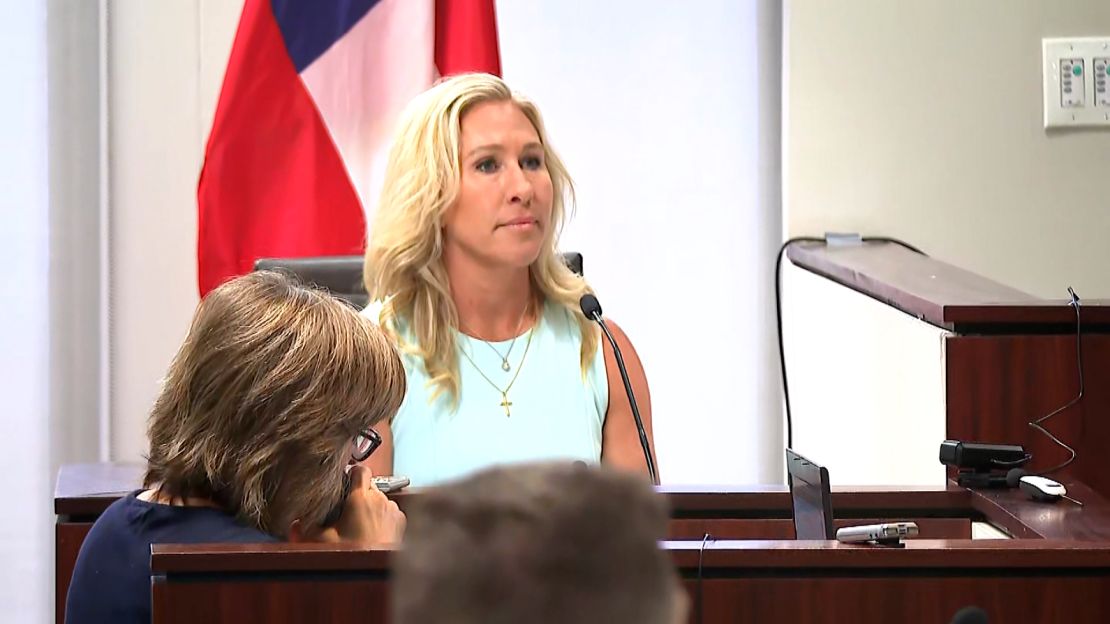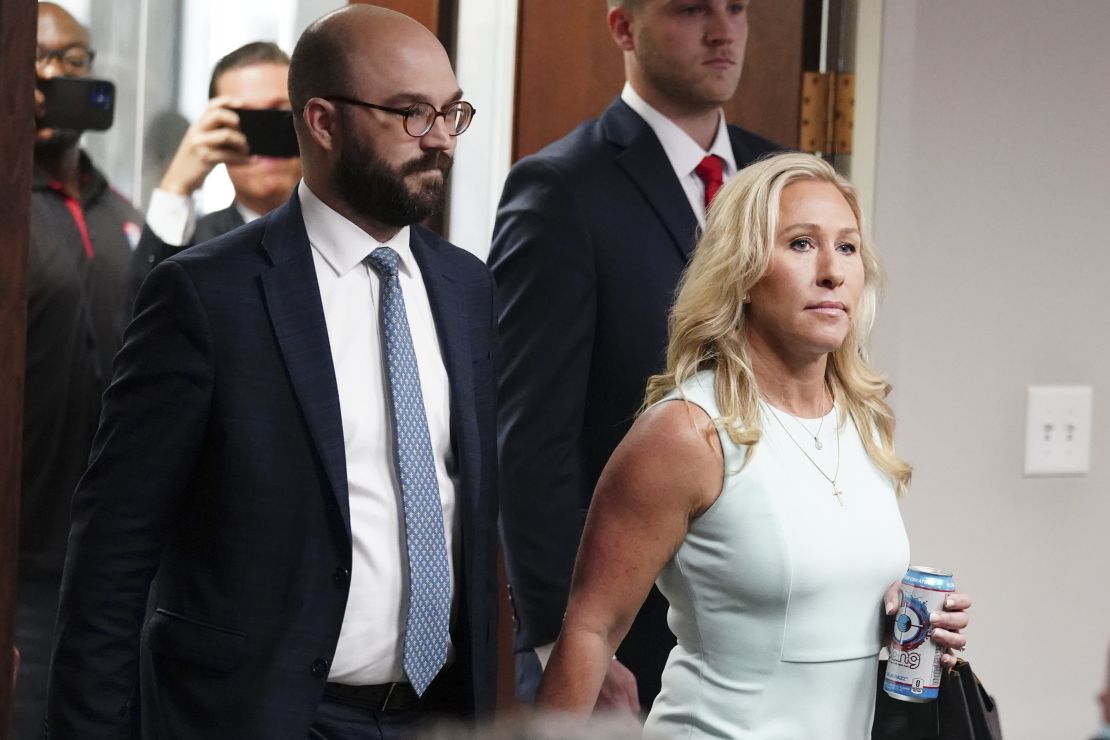Republican Rep. Marjorie Taylor Greene of Georgia testified under oath for three hours Friday at an unprecedented disqualification hearing that focused on whether she is constitutionally barred from holding office because of her role in the January 6 insurrection.
On the witness stand, Greene repeated debunked claims that former President Donald Trump won the 2020 election, and even brought up false-flag conspiracy theories that the US Capitol was attacked by rogue FBI agents or racial justice activists who “dressed up as Trump supporters.”
Her testimony, during an extraordinary all-day hearing in Atlanta, makes Greene the first member of Congress to answer questions under oath about their activities related to January 6.
The candidacy challenge was initiated by a group of Georgia voters, who are working with a coalition of liberal activists and constitutional scholars. They face an uphill climb to remove Greene from the ballot, and the judge on Friday appeared skeptical of some of their arguments.
Their lawyers grilled Greene about her ties to the far-right provocateurs and extremist groups who fueled the carnage at the Capitol. But her testimony did not establish that she had been aware of plans for violence or that she had coordinated with any rioters – and she deflected many questions about her activities before January 6 by saying more than 50 times that she couldn’t remember.
“I was asking people to come for a peaceful march, which is what everyone is entitled to do under their First Amendment, but I was not asking them to actively engage in violence or any type of action,” Greene testified, pushing back on the assertion that she had aided the insurrection.
The case revolves around a Civil War-era provision of the 14th Amendment, which says any American official who takes an oath to uphold the Constitution is disqualified from holding any future office if they had “engaged in insurrection or rebellion against the same, or given aid or comfort to the enemies thereof.” But how this applies today is a hotly debated legal question.
State Judge Charles Beaudrot, who presided over the all-day hearing, is expected to issue his recommendation within the next few weeks. Georgia Secretary of State Brad Raffensperger, a Republican, will then take Beaudrot’s findings and decide whether to disqualify Greene from the May 17 primary.
The outcome in the case could have national implications, because liberal attorneys have said they will mount a similar challenge against Trump if he runs again for president in 2024.
Legal cat-and-mouse game
Without direct evidence linking Greene to any rioters, the challengers focused on her rhetoric and how her calls to action in the weeks before January 6 had potentially inspired the insurrection.
“She was one of several leaders who gathered the kindling, who created the conditions, who made it possible for there to be an explosion of violence at the Capitol on January 6. And then, she dropped the match,” Andrew Celli, lawyer for the challengers, said in his closing arguments. “Now, she comes into this courtroom and says she’s surprised and appalled that a fire burned.”
At times, the proceedings felt like a legalistic cat-and-mouse game, with the challengers trying to pin Greene down on her previous comments, including some that appeared to stoke violence.
She said she didn’t remember saying she opposed the peaceful transfer of power to President Joe Biden – right before lawyers for the challengers played a video of her saying just that. She denied calling House Speaker Nancy Pelosi a “traitor” who might deserve the death penalty, but backtracked and acknowledged the comment when the challengers started to play the footage.
Celli asked Greene if she had liked a Facebook post that said, “a bullet to the head would be a quicker way to remove” Pelosi. (CNN previously unearthed the liked post, and others where Greene indicated supported for executing prominent Democrats.)
“I have had many people manage my social media account over the years,” Greene replied, in reference to the threatening post about Pelosi from 2019. “I have no idea who liked that.”
She said she had never intended to promote violence on January 6 and that she didn’t recall any conversations with lawmakers or Trump officials about disrupting the Electoral College count.
“I only believe in peaceful demonstration,” Greene said. “I do not support violence.”
She also denied giving any tours of the Capitol complex before the attack, rejecting the still unproven allegation from some Democratic lawmakers that the rioters had insider assistance.

Greene’s lawyer decries ‘show trial’
Greene entered the courtroom to rousing applause and cheers from supporters. A court security official swiftly chastised the crowd and the judge later warned that outbursts would not be tolerated. Rep. Matt Gaetz, a Florida Republican who has joined Greene at events in support of the January 6 defendants, sat with her legal team for most of the proceedings.
Her attorney, James Bopp Jr., called the hearing a “political show trial” and said the affair was a massive violation of her constitutional rights. When the challengers questioned Greene, Bopp repeatedly interrupted with objections – and the judge agreed on several key occasions, leading him to rein in the challengers and telling them at one point, “You are pushing the envelope.”
Bopp briefly questioned Greene on the witness stand, calling her a “victim” of January 6 and focusing on the fear she had felt while she was escorted to safety that day. She was on the House floor, objecting to Biden’s electoral votes from Arizona, when the mob breached the building.
“i was scared,” Greene testified, even though she later said that some of the rioters were patriots. “I was concerned. I was shocked. … I had no idea what was going on. … I did not want to see anyone get hurt. It was very upsetting. I was very upset.”
The hearing itself was something Greene had hoped to avoid. She had filed a federal lawsuit to shut down the state process – which is how GOP Rep. Madison Cawthorn fended off a similar challenge in North Carolina. But in a blistering 75-page ruling on Monday, a federal judge rejected many of Greene’s legal arguments and cleared the way for Friday’s hearing.
The challenges against Greene and Cawthorn are backed by Free Speech for People, a legal advocacy group, and Our Revolution, a left-wing group founded by Sen. Bernie Sanders of Vermont. They are appealing the court ruling in North Carolina, which effectively killed their anti-Cawthorn efforts.

What happens next?
The burden of proof is on the challengers to show by a “more likely than not” standard that January 6 was legally an insurrection and Greene actively aided the insurrectionists.
Beaudrot, the judge, said the legal questions at play were “deadly serious” and repeatedly tried to maintain some level of order during the circus-like hearing. Post-trial briefs are due next Thursday, and Beaudrot is expected to issue his recommendation sometime within the next few weeks.
The decision whether to disqualify Greene will be made by Raffensperger, who was infamously on the receiving end of a call where Trump pressured him to “find” enough votes to overturn Biden’s surprise victory in Georgia.
Georgia’s primary ballots are already being printed, so if Greene is disqualified, state officials will post notices at polling places announcing that she is not an eligible candidate and votes for her will not be counted. Greene can appeal a disqualification in state courts.
This story and headline have been updated with additional developments Friday.
CNN’s Christian Sierra and Sonnet Swire contributed to this report.





















